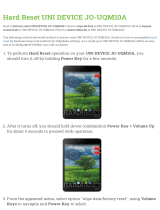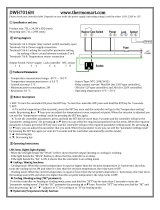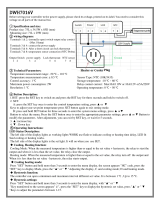
User Instructions Low Temperature Freezers Model UNI/LT
9
OA1 Second relay configuration: ALr: alarm;
LHt: auxiliary; onF: always on;
dEF: do not select it!.; FAn: do not select it!.;
AoP Alarm relay polarity: it set if the alarm
relay is open or closed when an alarm hap-
pens. CL= the relay is closed; oP = the relay
is open
i1P Digital input polarity: oP: the digital input
is activated by opening the contact; CL:
the digital input is activated by closing the
contact.
i1F Digital input configuration:
EAL = external alarm: “EA” message is dis-
played; bAL = serious alarm “CA” message is
displayed. PAL = pressure switch alarm, “CA”
message is displayed; dor = door switch
function; dEF = activation of a defrost cycle;
LHt =switch on the second relay if oA1=LHt;
Htr = kind of action inversion (cooling – heat-
ing).
did: (0÷255 min)
with i1F= EAL or i1F = bAL digital input alarm
delay: delay between the detection of the
external alarm condition and its signalling.
with i1F= dor: door open signalling delay
with i1F = PAL: time for pressure switch func-
tion: time interval to
calculate the number of the pressure switch
activation.
nPS Pressure switch number: (0 ÷15) Number
of activation of the pressure switch, during
the “did” interval, before signalling the
alarm event (I2F= PAL). If the nPS activation
in the did time is reached, switch off and on
the instrument to restart normal regulation.
• odc Compressor status when open door:
no, Fan = normal; CPr, F_C = Compressor
OFF
OTHER
PbC Type of probe: it allows to set the kind
of probe used by the instrument: PbC = PBC
probe, ntC = NTC probe.
• rEL Software release for internal use.
• Ptb Parameter table code: readable only.
DIGITAL INPUT
The free contact digital input is program-
mable in five different configurations by the
“i1F” parameter.
DOOR SWITCH INPUT (i1F = dor)
It signals the door status and the corre-
sponding relay output status through the
“odc” parameter:
no, Fan = normal (any change);
CPr, F_C = Compressor OFF;
Since the door is opened, after the delay
time set through parameter “did”, the door
alarm is enabled, the display shows the mes-
sage “dA” and the regulation restarts. The
alarm stops as soon as the external digital
input is disabled again. With the door open,
the high and low temperature alarms are
disabled.
GENERIC ALARM (i1F = EAL)
As soon as the digital input is activated the
unit will wait for “did” time delay before
signalling the “EAL” alarm message. The
outputs status don’t change. The alarm
stops just after the digital input is de-acti-
vated.
SERIOUS ALARM MODE (i1F = bAL)
When the digital input is activated, the unit
will wait for “did” delay before signalling the
“CA” alarm message. The relay outputs are
switched OFF. The alarm will stop as soon as
the digital input is de-activated.
PRESSURE SWITCH (i1F = PAL)
If during the interval time set by “did” pa-
rameter, the pressure switch has reached
the number of activation of the “nPS” pa-
rameter, the “CA” pressure alarm message
will be displayed. The compressor and the
regulation are stopped. When the digital
input is ON the compressor is always OFF.
If the nPS activation in the did time is re-
ached, switch off and on the instrument
to restart normal regulation.
SWITCHING SECOND RELAY ON (i1F = LHt)
With oA1= LHt it switches on and off the
second relay.
START DEFROST (i1F = dFr)
It starts a defrost if there are the right condi-
tions. After the defrost is finished, the normal
regulation will restart only if the digital input
is disabled otherwise the instrument will wait
until the “MdF” safety time is expired.
INVERSION OF THE KIND OF ACTION: HEAT-
INGCOOLING (i1F = Htr)
This function allows to invert the regulation of
the controller: from cooling to heating and
viceversa.




















